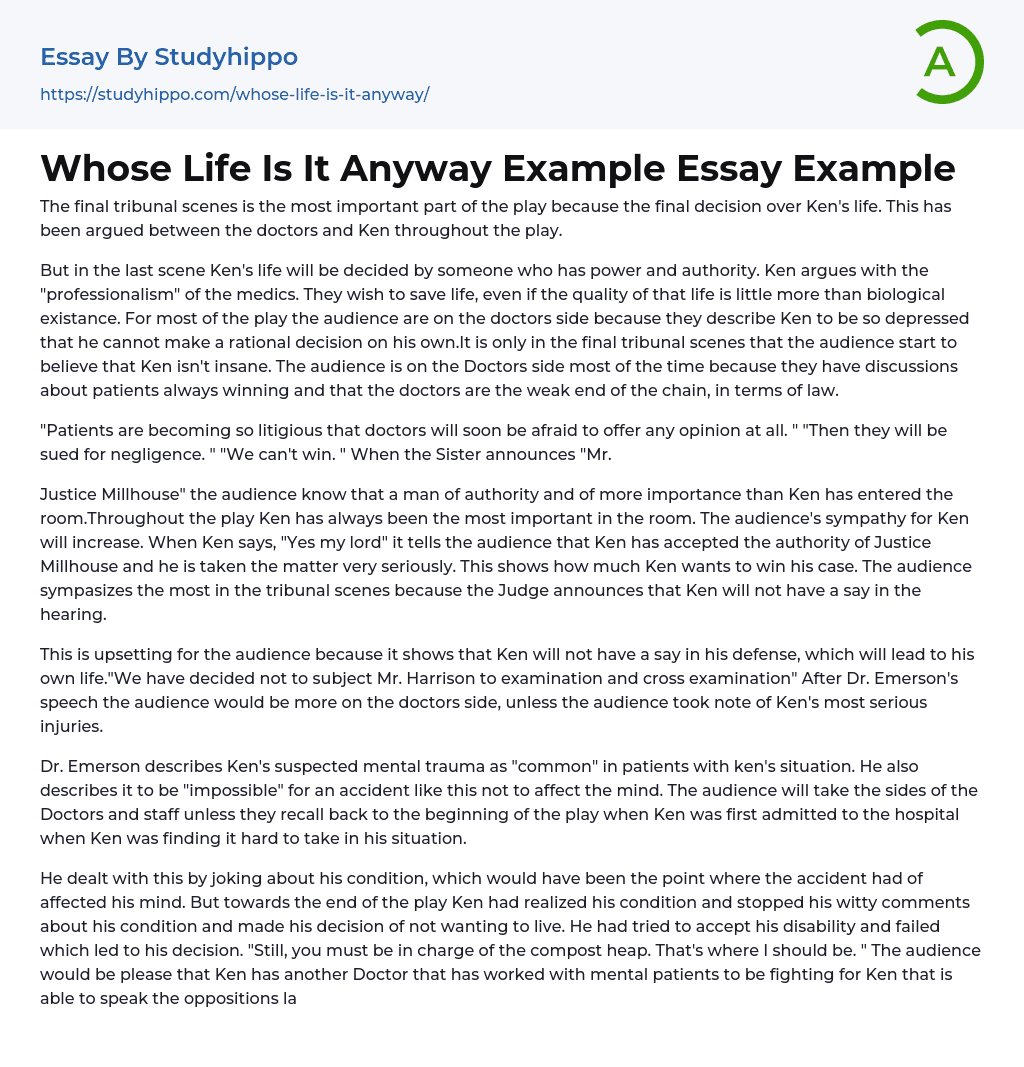The final tribunal scenes carry the utmost significance in the play as they hold the key to Ken's fate, a matter that has been at the forefront of the discourse between Ken and the doctors throughout the play.
Throughout the play, the audience is initially led to side with the doctors who argue that Ken, who is severely depressed, is incapable of making rational decisions. However, in the final scene, Ken's fate rests in the hands of someone who holds power and authority. Ken disputes the medics' focus on preserving life, even if it means a mere biological existence. The audience begins to question Ken's sanity only during the tribunal scenes. The doctors' discussions about patients always winning and their vulnerability within the legal system further reinforce the audience's initial support for them.
The announcement made by the
...Sister confirms that doctors are becoming more hesitant to express their opinions due to increasing litigiousness among patients. This fear stems from the possibility of being sued for negligence, which would leave them with no chance of winning.
The entry of "Justice Millhouse" signifies the arrival of a person of higher authority than Ken. Previously, Ken had been the most significant character in the play, but with this introduction, the audience's sympathy towards him is likely to increase. Ken accepts the authority of Justice Millhouse by saying, "Yes my lord," indicating that he is taking the matter at hand seriously and demonstrating his strong desire to win the case. In the tribunal scenes, the audience is most sympathetic towards Ken when the Judge announces that he won't have a say in the hearing.
The audience will be distresse
as it suggests that Ken will not be able to defend himself, putting his life at risk. "We have decided not to subject Mr. Harrison to examination and cross-examination." Dr. Emerson’s speech may sway the audience towards the doctors’ standpoint, but they may also take into consideration Ken's severe injuries.
According to Dr. Emerson, patients in Ken's situation commonly experience mental trauma, which he considers impossible to avoid after an accident like this. The audience may empathize with the doctors and staff unless they remember Ken's initial struggles to comprehend his condition when he was admitted to the hospital earlier in the play.
During the play, Ken coped with his condition by using humor, despite the possibility of the accident affecting his mental state. However, as the play progressed, Ken became aware of his condition and ceased making jokes. Ultimately, he decided that he did not want to live because he failed to accept his disability. In his last moments, Ken expressed his desire to be in charge of the compost heap. Fortunately, the audience would be comforted to know that another doctor who has experience working with mental patients would support Ken and speak on his behalf.
Ken benefits from not having medical jargon used against him by the opposing side, which could cause the judges to take their side. When Dr. Barr opposes Ken's decision, it makes it seem like Ken has been let down, causing the audience to sympathize with him. It appears that Ken is in a vulnerable and isolated position during the informal hearing, as his only defensive resource has failed him.
Despite Dr. Barr acknowledging Ken's rational decision-making ability, his disagreement with Ken's
decision ultimately reinforces the view that Ken cannot succeed. Dr. Barr explicitly states, "No, I thought he made the wrong decision."
(To Ken) Apologies. The nurse helps Ken place his hand on the bible, serving as a reminder of his situation and decision to end his life. Given his defense, which employs personal wit, intelligence, and sources found in media, the audience would likely side with Ken during his speech unless they believe he is masking his depression using these qualities.
Ken recalled reading about something in the papers. After both sides presented their arguments, the audience rallied behind him as they believed he had the right to life and was struggling to accept his disability rather than suffering from depression. The judge kept the audience on edge when delivering his final decision by adding surprising twists after summarizing the case. Ken refused Dr. Scott's kiss, suspecting she was attempting to sway his opinion.
Ken believes that Dr. Scott's effort to persuade him could be viewed as an inappropriate expression of love and might cause him to rethink his initial decision, given their proximity at the hospital. Nevertheless, Ken is hesitant to let their amicable relationship progress into a more profound attachment because of his distinctive situation.
- Jurisprudence essays
- Social Injustice essays
- Juvenile Justice essays
- Business Law essays
- Contract essays
- Consumer Protection essays
- Property essays
- Ownership essays
- Agreement essays
- Common Law essays
- Contract Law essays
- Justice essays
- Security essays
- Tort Law essays
- United States Constitution essays
- Crime essays
- Lawsuit essays
- Treaty essays
- Family Law essays
- Marijuana Legalization essays
- Constitution essays
- War on Drugs essays
- Court essays
- Jury essays
- Police essays
- Protection essays
- Community Policing essays
- Criminal Law essays
- Judge essays
- Lawyer essays
- Employment Law essays
- Copyright Infringement essays
- Injustice essays
- Intellectual Property essays
- Breach Of Contract essays
- Internet Privacy essays
- Cyber Security essays
- Bill Of Rights essays
- Civil Liberties essays
- First Amendment To The United States Constitution essays
- Fourth Amendment To The United States Constitution essays
- Second amendment essays
- Animal Cruelty essays
- Law Enforcement essays
- Juvenile Justice System essays
- Surveillance essays
- Forensic Science essays
- Crime Prevention essays
- Criminal Justice essays
- Criminology essays




